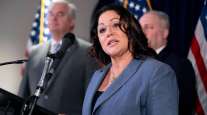Holiday Shipments Seen at Risk in Port Labor Strife

Protracted labor talks at the busiest U.S. container ports are leading to delayed deliveries to some retailers, and may result in a lot of gift cards under Christmas trees in place of absent presents, FedEx Corp. said.
The backlog has already caused FedEx to shift resources and limit shipments from some customers to avoid a last-minute pre-Christmas surge, the company said. FedEx expects to deliver a record 290 million packages during the peak holiday season.
Cargo congestion has been building for months as the pace of ship loading and unloading slows amid bargaining between the Pacific Maritime Association and 20,000 West Coast dockworkers. The National Retail Federation estimated a strike or lockout could cost the U.S. economy more than $2 billion a day. The dispute affects 29 ports, including Los Angeles and Long Beach in California.
FedEx ranks No. 2 on the Transport Topics Top 100 list of the largest U.S. and Canadian for-hire carriers.
“The slowdown in the West Coast ports has been a much bigger deal than people think, and a tremendous amount of inventory was simply not put through the ports in the timeframe that the retailers had expected,” FedEx Chief Executive Officer Fred Smith said on a conference call to discuss earnings.
UPS Inc., which ranks No. 1 on the for-hire TT 100, also has “seen some examples at selected retail customers where the dock workers issue has impacted their ability to add inventory,” Andy McGowan, a company spokesman, said in an e-mail.
Some retailers are seeing a drag from tardy shipments. Last week, Lululemon Athletica Inc. said deliveries are late seven to 10 days and estimated that fourth-quarter revenue will be hurt by about $10 million. The yogawear maker will reroute many orders arriving at the end of December through Vancouver, where the company is based, resulting in one- to three-day delays, Chief Financial Officer John Currie said on a Dec. 11 conference call.
Macy’s Inc. said last month that it was seeing a lag getting products onto shelves, though it hadn’t yet had a significant impact. Terry Lundgren, CEO of the department-store chain, called on President Barack Obama to help resolve the impasse and sought help from his friend Doug McMillon, the CEO of Wal-Mart Stores Inc.
“I suspect that you’ll see a lot of purchases of gift cards in lieu of merchandise,” FedEx’s Smith said.
The National Retail Federation said many retailers started stocking their shelves early as the port labor negotiations dragged on over the summer.
“For the most part, most folks have their products in, and retailers are trying to do anything they can to ensure the product will be there when customers walk in,” Jon Gold, vice president of supply chain and customs policy at the NRF, said in an interview.
The NRF has urged Obama to engage a federal mediator in the port dispute.
Two container ships and two bulk carriers awaited berths at the Port of Los Angeles early this afternoon, one of the lowest numbers in two months, port spokesman Phillip Sanfield said. The lower number of ships queued up in the harbor suggests that congestion is easing “slightly,” he said.
Craig Merrilees, a spokesman for the International Longshore and Warehouse Union, challenged FedEx to provide figures showing delays in unloading port cargo were causing consumers to switch to gift cards.
FedEx and UPS have implemented plans to try to avoid a repeat of last year, when a crush of last-minute online shopping and severe winter weather waylaid some deliveries.
The port setback also could hurt FedEx if the stalled inventory shipments represent lost, instead of delayed, sales, said Kelly Dougherty, a Macquarie Capital analyst in New York.
“This port issue is a really big issue that’s not just impacting cargo shipping companies or retailers,” she said in an interview. “It’s clearly having an impact throughout the transportation complex.”
In March, Smith scolded online retailers for contributing to delays during last year’s peak shipping season by not properly preparing packages, improperly affixing labels and sometimes claiming parcels has been shipped to FedEx or UPS when they hadn’t.
Traditional “brick-and-mortar” retailers have improved their abilities to market and sell online, yet are sometimes falling short when it comes to processing and shipping orders, Smith said. Some of those backlogged shipments also are moving from November into December, he said.
FedEx has boosted resources on both coasts to pick up stalled goods it normally would distribute from the middle of the country. East Coast ports have been affected by traffic diverted there by some companies seeking to avoid the slowdown on the West Coast, Smith said.




